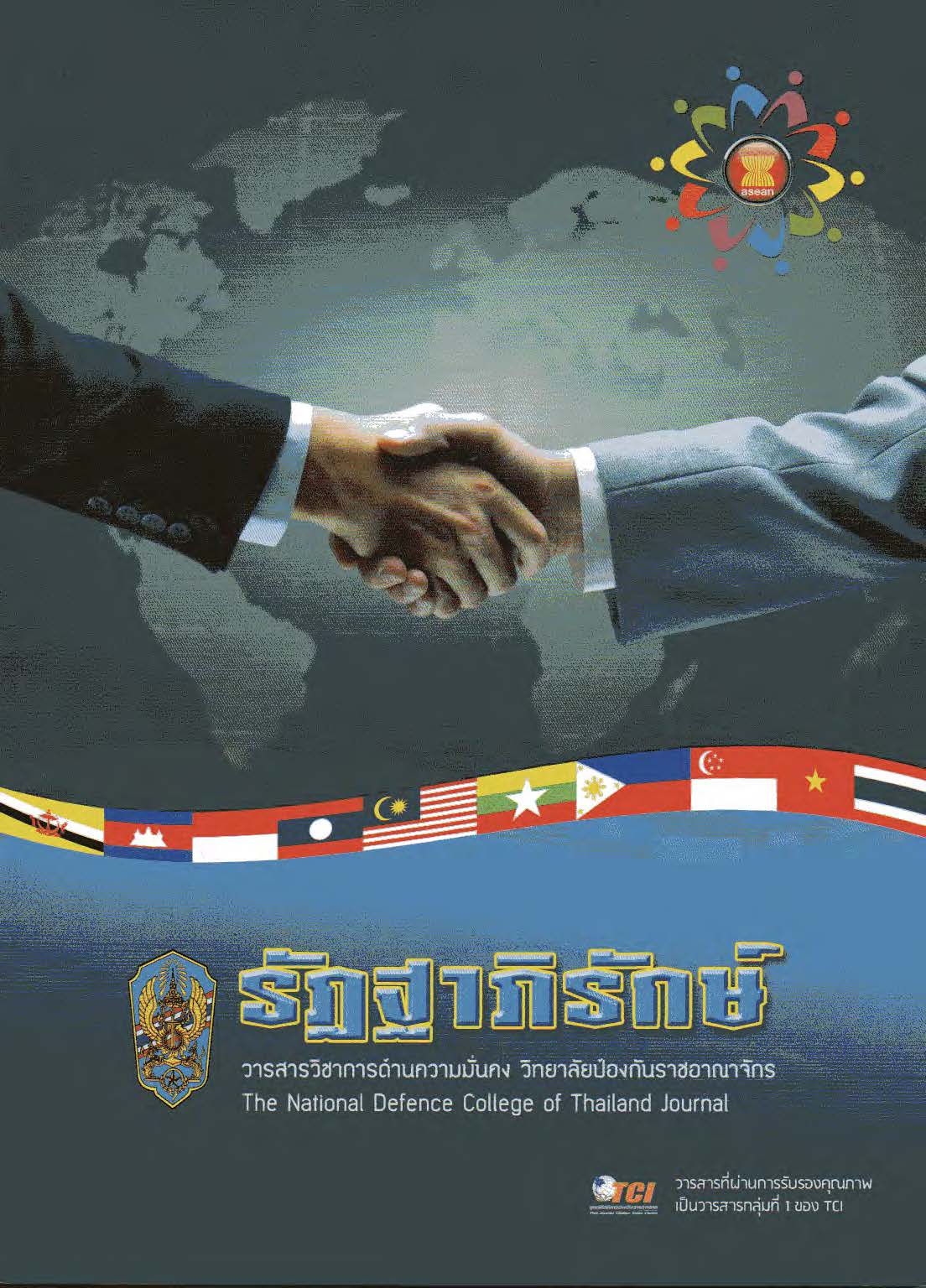ยุทธศาสตร์เส้นทางสายไหมทางทะเลของจีน : ความเกี่ยวข้องต่ออาเซียนและเอเชียตะวันออกเฉียงใต้
คำสำคัญ:
ยุทธศาสตร์จีน, เส้นทางสายไหม, Chinese strategy, Silk Roadบทคัดย่อ
ยุทธศาสตร์เส้นทางสายไหมทางทะเลของจีน : ความเกี่ยวข้องต่ออาเซียนและเอเชียตะวันออกเฉียงใต้
บทคัดย่อ
การวิจัยในครั้งนี้มีวัตถุประสงค์เพื่อศึกษายุทธศาสตร์เส้นทางสายไหมทางทะเลของจีน ซึ่งเป็นยุทธศาสตร์ใหม่ของจีนในการที่พาจีนยุคใหม่ก้าวไปสู่ระดับโลกและฟื้นคืนความยิ่งใหญ่ของจีนอีกครั้งเฉกเช่นในอดีตในฐานะอาณาจักรศูนย์กลางของเส้นทางสายไหม โดยการศึกษาจะวิเคราะห์ถึงสาเหตุ ที่มาและปัจจัยสำคัญที่ทำให้จีนต้องริเริ่มยุทธศาสตร์เส้นทางสายไหมทางทะเล รวมทั้งศึกษาแนวทางและโครงการที่เกิดขึ้นภายใต้ยุทธศาสตร์เส้นทางสายไหมทางทะเล ทั้งในเรื่องรูปแบบดำเนินการ โครงการและกิจกรรมที่เกิดขึ้น รวมทั้งผลดีและผลกระทบต่อภูมิภาคเอเชียตะวันออกเฉียงใต้ เพื่อนำข้อมูลที่ได้ศึกษาแล้วมาสร้างให้เกิดความเข้าใจและความตระหนักถึงความสำคัญของยุทธศาสตร์เส้นทางสายไหมทางทะเล อีกทั้งนำข้อมูลที่ได้ศึกษามาเสนอแนะแนวทางในการดำเนินยุทธศาสตร์ของประเทศไทยในการการเตรียมการรับมือและแสวงประโยชน์จากโครงการต่างๆที่จะเกิดขึ้นจากยุทธศาสตร์เส้นทางสายไหมทางทะเลของจีน
ผลการวิจัยพบว่ายุทธศาสตร์เส้นทางสายไหมทางทะเลของจีนเป็นหนึ่งเป็นในยุทธศาสตร์เชิงรุกในกรอบ One Belt One Road ที่รัฐบาลจีนในยุคของประธานาธิบดีสี จิ้นผิง ริเริ่มขึ้นเพื่อขยายบทบาทอิทธิพลของจีนในเวทีโลก ถ่วงดุลอำนาจสหรัฐอเมริกา ลดความขัดแย้งระหว่างประเทศโดยเฉพาะข้อพิพาทเหนือหมู่เกาะ และพัฒนาเศรษฐกิจของจีนให้เติบโตอย่างยั่งยืน ด้วยการขยาย Soft Power ของจีน ผ่านการสร้าง “ความเชื่อมโยง” (Connectivity) และ “ความร่วมมือ” (Cooperation) รอบด้าน กับนานาประเทศในภูมิภาคเอเชียตะวันออกเฉียงใต้ ภูมิภาคเอเชียกลาง ภูมิภาคเอเชียใต้ ภูมิภาค ตะวันออกกลาง ภูมิภาคแอฟริกา และ ยุโรป โดยรัฐบาลจีนจะใช้ยุทธศาสตร์เส้นทางสายไหมทางทะเลที่มีลักษณะเป็นกลไกสำคัญในการเสริมสร้างความเชื่อมโยงแบบหลายมิติกับประเทศต่างๆ ที่ตั้งอยู่บนแนวพื้นที่เศรษฐกิจของจีน เพื่อกระชับความร่วมมือทางทะเลกับอาเซียน อันจะช่วยผลักดันความสัมพันธ์ระหว่างจีนกับภูมิภาคเอเชียเอเชียตะวันออกเฉียงใต้จากช่วงทศวรรษแห่งยุคทองไปสู่ช่วงทศวรรษแห่งยุคเพชร นอกจากนี้ความร่วมมือที่เกิดขึ้นจะนำไปสู่การระดับลดความตึงเครียดระหว่างจีนกับประเทศคู่ขัดแย้งในภูมิภาคจากกรณีข้อพิพาทในทะเลจีนใต้ พร้อมทั้งสามารถสร้างภาพลักษณ์ที่ดีให้กับรัฐบาลจีน
ABSTRACT
This research aims to study the Maritime Silk Road strategy, the People’s Republic of China’s strategic initiative, to propel China to international level and restore China’s status as superpower as it has successfully done in the past; when the Empire of China was recognised as the hub of Silk Road. The study will explore factors caused China to revive the Maritime Silk Road as we as policies, procedures, activities and projects resulting from the Maritime Silk Road strategy the opportunities and threats it creates to countries in Southeast Asia are also thoroughly examined. This research will create better understanding and recognition of the importance of the Maritime Silk Road strategy. The information gained can also be incorporated into Thailand’s strategic planning in response to China’s Maritime Silk Road strategy, so that Thailand can adopt measures to respond and gain advantages from various projects that are part of the Chinese strategy in the 21st century.
The study finds that the Maritime Silk Road strategy is part of China’s approach strategy under One Belt One Road framework proposed by Chinese President Xi Jinping to expand China’s global influence and to counter the United States influence. The move will also help reduce the international conflicts, especially maritime territorial disputes, and sustainably develop China’s economic growth by expanding China’s soft power by establishing connectivity and cooperation with various countries in Southeast Asia, Central Asia, South Asia, Middle East, Africa, and Europe. Chinese government will utilise the Maritime Silk Road strategy, a core mechanism to induce multidimensional connectivity with China’s economic corridor, to increase maritime cooperation within ASEAN which will assist in mobilising the relation between China and Southeast Asia from the Golden Decade to the Diamond Decade. In addition, this cooperation will possibly ease the tension between China and opposing parties in South China Sea dispute and build positive image for the Chinese Government as the friendly major power in the world community.
ดาวน์โหลด
เผยแพร่แล้ว
ฉบับ
ประเภทบทความ
สัญญาอนุญาต
บทความ ข้อเขียน หรือความคิดเห็นในนิตยสารนี้เป็นของผู้เขียน ไม่ผูกพันกับวิทยาลัย ป้องกันราชอาณาจักรและทางราชการแต่อย่างใด



